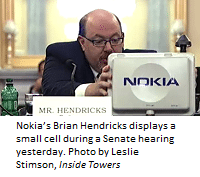 Some localities are worried they would get less say in how broadband is deployed in their areas based on legislation that Congress is preparing and rules the FCC has proposed to streamline such deployment nationwide.
Some localities are worried they would get less say in how broadband is deployed in their areas based on legislation that Congress is preparing and rules the FCC has proposed to streamline such deployment nationwide.
Senate Commerce Committee Chairman John Thune (R-S.D.) said during a hearing on reducing barriers to broadband infrastructure deployment on Wednesday regulators are working to reduce digital disparity between rural and urban areas, and with good reason. “In places like South Dakota, you are lucky if you have a six-month window to lay fiber,” noting companies need to begin the permitting process one to two years ahead of time.
Yet regulators must be cognizant of the roles localities play in the infrastructure permitting process. Wilton Manors, FL Mayor Gary Resnick told lawmakers when localities deny installs in public rights-of-way it’s for a good reason. “We pay a price in Florida to live in paradise. Because of hurricanes, it makes sense to construct utilities underground,” so residents can drive away quickly after a storm. “The only safe way to pull off a road and not get submerged is to not have anything in the way.”
His town’s local siting codes “address practical issues.” Resnick’s worried the proposals currently on the table “would minimize” the roles of local municipalities.
Cost is another factor in allowing infrastructure siting in public rights-of-way. Wilton Manors just spent $210,000 on new light poles. It’s “unfair for anyone to attach to them for free,” said Resnick.
But sometimes localities are charging excessive fees, according to Brian Hendricks, head of Technology Policy & Public Affairs for the Americas Region, Nokia Corporation. In some areas third parties are representing local governments, helping to drive up the costs. Displaying a typical Nokia small cell, Hendricks said “It’s typical to pay a $3,000 site inspection fee to put this on a pole.” Add in a $1,500 per month lease fee and other costs drive up the total regulatory costs to $22,000. That doesn’t include getting power to it nor backhaul, he added. The fees providers like Nokia face are “well beyond what makes deployment viable” in rural areas.
Following the hearing, Wireless Infrastructure Association President/CEO Jonathan Adelstein said the “Committee’s work to help improve access to federal lands for wireless communications facilities and streamline the processes for deploying wireless infrastructure is key to creating a more predictable business environment for broadband infrastructure investment.” He encouraged the full Senate to pass the Mobile Now Act, calling the measure “an important step toward removing unreasonable barriers to wireless broadband investment and deployment.”
May 4, 2017




Reader Interactions